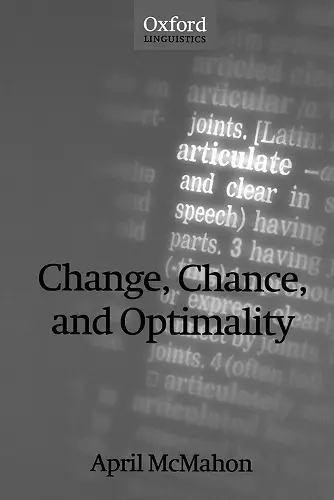Change, Chance, and Optimality
Exploring the dynamics of language evolution and theory critique
Format:Paperback
Publisher:Oxford University Press
Currently unavailable, and unfortunately no date known when it will be back
This paperback is available in another edition too:
- Hardback£56.00(9780198241249)

This book critically examines how languages evolve, focusing on the limitations of Optimality Theory in explaining language change and variation.
In Change, Chance, and Optimality, April McMahon delves into the intricate dynamics of language evolution, presenting a compelling critique of Optimality Theory (OT), the prevailing framework in contemporary phonology. The author argues that OT, while influential, fails to adequately explain the complexities of language change and variation. By outlining the foundational principles of OT, McMahon highlights its limitations in addressing the historical and contingent factors that shape linguistic development.
The book emphasizes the necessity of incorporating historical context and chance into linguistic theories to provide a more robust understanding of language change. McMahon draws on cross-linguistic data and compares OT with other linguistic theories, revealing the shortcomings of OT in accounting for linguistic phenomena without resorting to additional rules. This critical analysis not only challenges the status quo within linguistics but also encourages a reevaluation of how theoretical frameworks can evolve to better reflect the realities of language.
Ultimately, Change, Chance, and Optimality serves as a thought-provoking examination of the intersection between linguistic theory and the historical processes that drive language evolution. McMahon’s work prompts readers to consider the broader implications of linguistic change, advocating for a more nuanced approach that acknowledges the role of historical contingencies and the evolution of human language capacity.
This formidable critique of Optimality Theory (OT) should be required reading for all graduate students in linguistics. Phonologists of every stripe - synchronic and diachronic, regardless of the theories in which they work - ignore it at their peril. Anyone with even a passing interest in linguistic theory would also be well advised to read it, because its implications reach well beyond phonology to involve current hypotheses about the nature and evolution of human language ... this volume should solidfy McMahon's reputation as one of the most insightful linguistic theorists currently writing. * General Linguistics *
A critical contribution to the debate on how Optimality Theory accounts (or cannot account) for historical change ... a hard and prolonged look at the claims and practices of OT. * Years Work in English Studies *
A stunning book, elegantly argued and deftly written. A major theoretical critique, confronting Optimality Theory and other formalist innatist paradigms with the realities of evolutionary biology and neuroscience. One of the most important and sophisticated works in phonological theory of the past couple of decades. * Roger Lass, University of Cape Town *
ISBN: 9780198241256
Dimensions: 234mm x 156mm x 12mm
Weight: 323g
212 pages